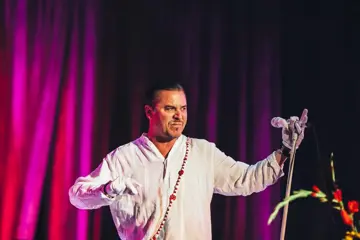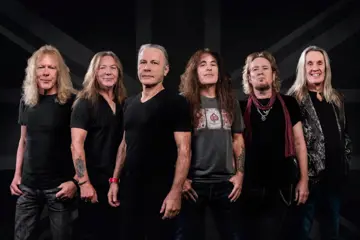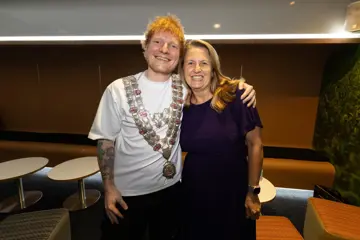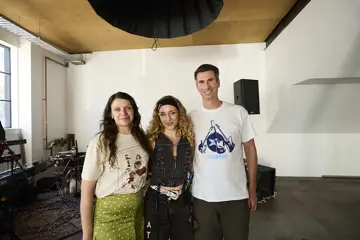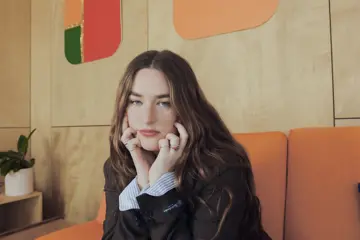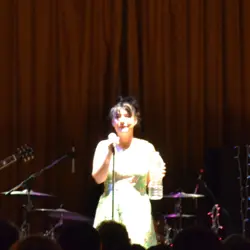 The Julie Ruin
The Julie RuinIn December 2010 Kathleen Hanna got up on stage in New York and played new material with her band The Julie Ruin. It was an odd experience for her because the night was a tribute gig for... well, Kathleen Hanna.
“It was really weird,” Hanna admits with delighted giggle. “I wanted to perform because I wanted to be like, 'Hey y'all, guess what? I'm not dead. I'm still here.' This wasn't a sombre thing following my funeral that happened earlier in the day. It felt like that's what it could be but there were a lot of great people on the stage.
“I really liked a lot of the performances, and seeing songs that I've been a part of writing being performed in new ways was one of the highlights of my career. The amount of pride I felt watching people do it so much better than I could ever do it was mind-blowing.”
The reasons Hanna deserved a tribute night while her career is still in full swing are long and legendary; feminist activist both on stage and off, frontwoman for Riot Grrrl pioneers The Bikini Kill and electronica trio Le Tigre, and inspiration for several generations of female musicians.
Don't miss a beat with our FREE daily newsletter
And for the last couple of years she's been fronting a new band. Originally The Julie Ruin name was used for a solo project Hanna was working on, but the singer then recruited musicians to turn The Julie Ruin into something more. The band's debut album, Run Fast, was released in September.
In contrast to Bikini Kill and Le Tigre, Hanna is approaching The Julie Ruin from a musical rather than political point of view. “In Bikini Kill it felt like I was on a mission addressing the backlash against feminism in the '90s and getting the word out that feminism still existed and be a part of updating it for my generation. Then in Le Tigre there was a similar sort of thing, of writing the unwritten song that people weren't writing and trying to make political dance music and really celebrating the idea that you didn't have to choose between politics and pleasure and making that a big part of what we did.
“With the new record it's just like I didn't have an agenda. Letting the songs tell me what they want to be rather than me telling the songs and whipping them into shape.”
And while Hanna and her new bandmates still cover political topics in their songs, the basis for The Julie Ruin's music is addictive pop hooks. “We love hooks. Our whole thing was we wanted to make a hook sandwich – a hook inside a hook, where the bread is like a hook and the inside of the sandwich is another hook. All five of us love choruses and we love verses. We love it to be really clear.
“I just don't see any shame in using that formal structure. It makes me feel all kind of safe and I can play inside of that however I want. By having those limits around me I almost feel free.”
With music rather than politics the main focus of The Julie Ruin, Hanna says her approach to performing live has also changed from those early years in Bikini Kill and Le Tigre. “I was a lot more insecure when I was younger and in a way I had to put on a pose when I went on stage.
“It's not like I wasn't acting myself in either of those bands but I think it was much more calculated definitely and more protective of myself. I used to have to listen to Public Enemy for an hour before I went on stage to get myself hyped up.”
In the last days of Le Tigre and while Hanna was recruiting members for The Julie Ruin and then recording their debut album, Hanna was also battling what she now knows is Lyme Disease, a debilitating and often misdiagnosed condition from which she is currently in remission.
Conquering the disease has given Hanna another reason to drop the performance art aspect of her sets. “I've been through this rough illness over the past five or six years and coming through it and feeling much better for the most part I just really wanted to connect with the audience and be a part of creating a community that is really about the moment.
“We're not on our iPhones multitasking. We're in a room together enjoying music and enjoying each other's company. I think that's really important. I don't need to go out and be a performance artist. As corny and American as it sounds I'm just going out and being myself and it feels great to be accepted and not to have to act like anything but myself.”




